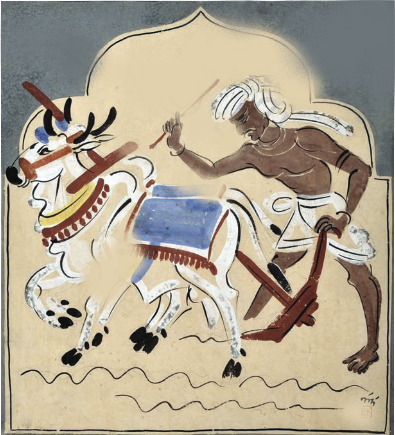The correct answer is Option 3- Nandalal Bose used watercolor for the bold cursory style and broad brushwork.

Nandalal Bose used thick tempera, not watercolor, for the bold cursory style and broad brushwork in the "Tiller of the Soil" panel.
Tiller of the soil- This is one of the panels made by Nandalal Bose in 1938 for the Haripura Congress. In this panel, a farmer is shown ploughing a field — the daily activity of a common man and in a village. To capture the essence of village life in his Haripura panels, Bose made pen-and-ink brush studies of local villagers. He used thick tempera in a bold cursory style and broad brushwork. This technique and style was reminiscent of the folk art practice of patuas or scroll painters. Folk style is purposely used to represent the rural life. It also conveys political statement of Gandhi’s idea of village. The background of the poster has an arch. The strong sense of formal design, bold colour scheme, and their blend of nature and convention in this panel reflect Bose’s inspiration from Ajanta wall paintings and sculptures. More than 400 posters were prepared at Kala Bhavana under the supervision of Bose, who was influenced by the idea of Gandhi. These posters place common people in the centre of nation building. Bose utilised art to build the nation’s moral character. |